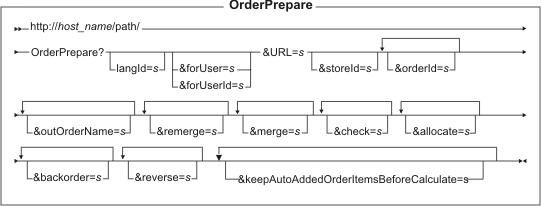Reference > Shop flow URLs > Order Management subsystem URLs > Orders URLs
OrderPrepare URL
Prepares an order by determining its prices, discounts, shipping charges, and taxes. If an order reference number is not specified, all current pending orders will be prepared for the current customer at the given store.
URL
OrderPrepare
Controller command
Implementation class
Commands called
ValidateShippingAdjustmentCmd
PrepareOrderCmd
URL structure
- http:// host/ path/
- The fully qualified name of the WebSphere Commerce Server and the configuration path.
 name-value pair with the &
character. For a detailed description of the parameters and their values, see the list entitled Parameter values." />
name-value pair with the &
character. For a detailed description of the parameters and their values, see the list entitled Parameter values." />
Parameter values
- langId
- Sets or resets the preferred language for the duration of the session; the supported languages for a store are found in the STORELANG table
- forUser
- The logon ID of the user on whose behalf the command runs; only a person with the authority to process orders can specify this parameter.
- forUserId
- Same as forUser, but identifying the user by the internal user ID as found in the USERS table.
- URL
- Required: The URL to be called when the command completes successfully.
- storeId
- The reference number of the store for which the order is to be prepared.
- orderId
- The reference number of the order to be prepared. If this parameter is omitted, this command defaults to the current pending orders. See Order abbreviations for a description. This parameter can be repeated.
- outOrderName
- Specifies the names of name-value pairs to be added to the redirection URL. The value of each added name-value pair is the reference number of the prepared order. If the name is not provided, the default name orderId is used. This parameter can be repeated.
- commit
- Controls whether each order is processed in a separate database transaction. A value of 0 specifies that all orders be prepared in one transaction; a value of 1 specifies that a new transaction is started for each order to be prepared. The default value of this parameter is 0.
- remerge
- A list of the order items that are to be merged with other order items in the same order and with the same correlationGroup attribute, if possible. Order items are not merged unless their InventoryStatus is NALC or they are specified by one or more of the allocate, backorder, and reverse parameters. This parameter can be repeated.
- merge
- A list of order items that are to be merged with other order items in the same order if possible, regardless of their correlationGroup attributes. This parameter can be repeated.
- check
- A list of order items that are to be checked by the CheckInventory task command. This parameter can be repeated.
- allocate
- A list of order items that are to be allocated from existing inventory. This parameter can be repeated.
- backorder
- A list of order items that are to be allocated from expected inventory. This parameter can be repeated.
- reverse
- A list of order items whose allocations are to be released (that is, de-allocated from existing or expected inventory, as appropriate). This parameter can be repeated.
- keepAutoAddedOrderItemsBeforeCalculate
- Indicates if the automatically-added order items in the order need to be kept (true) or removed (false) before the order is calculated. The default value is false.
Note for ATP inventory: The remerge, merge, check, allocate, backorder and reverse parameters are applicable only if ATP inventory is enabled (see INVENTORYSYSTEM column in the STORE table). They represent lists of order items that are passed to DoInventoryActionCmd. This command invokes AllocateInventory task command, which calls the CheckInventoryAvailabilityCmd, AllocateExistingInventoryCmd, AllocateExpectedInventoryCmd, DeallocateExistingInventoryCmd, and DeallocateExpectedInventoryCmd, GetEligibleFulfillmentCenters, ReserveInventory, AdjustInventoryReservation task commands as specified below. Also, these parameters accept order-item abbreviations, which are detailed in the help for Order Management subsystem URLs.
The default ATP parameter values are...
- remerge=*
- merge=*n
- check=*n
- allocate=*
- backorder=*
- reverse=*
If you want all order items for a store to be allocated in the OrderPrepare command, pass reverse=*n with allocate=*.
Example
The following example prepares an order with reference number 1 and redirects to the OrderDisplay command to view this order.
http://myhostname/webapp/wcs/stores/servlet/OrderPrepare?orderId=1
&URL=/webapp/commerce/OrderDisplay
Behavior
Check if the order is locked by the current CSR. If the order is not locked and called by a CSR, or if it is locked by another CSR, an exception is thrown
Call ValidateShippingAdjustmentCmd to validate that the order has not changed since a shipping adjustment was added
Call PrepareOrderCmd to do pricing, inventory and calculation on the order
Exception conditions
- If no orders match the specified parameters, the command throws
the ECApplicationException exception specifying the
ErrorOrderNoneCmd error view
command.
- If any of the products or items in the order are not buyable, the command throws the ECApplicationException exception specifying
the BadOrderDataErrorView error
view command. For
further information about exception conditions for order errors, refer
to Error Codes for Order Error Views.
- The command throws the ECApplicationException exception, specifying
the RetrievePriceErrorView error
view command if any of the following conditions are true:
- Input trading agreements (contracts) are not valid or eligible
for use.
- Trading agreements that are used in the order apply payment methods
that are incompatible.
- Price Lists cannot be retrieved for any of the products or items.
- Input trading agreements (contracts) are not valid or eligible
for use.
- If any calculation indicated by the USAGEFLAGS column in the STENCALUSG
table was unable to calculate a value for each order item in an order, and if the USAGEFLAGS column in the STENCALUSG table indicates that
a value must be calculated, then an ECApplicationException exception
is thrown.
- If an order has no order items, an ECApplicationException exception is thrown.
Related concepts
Related reference
Order Management subsystem URLs